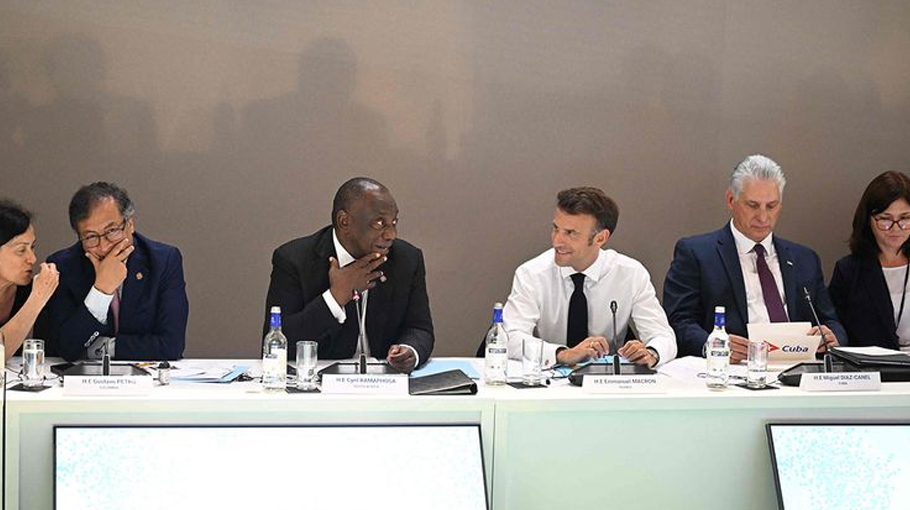Paris Summit’s transformative agenda for global financing
It’s essential for affluent nations to honour their commitments towards climate financing

A key summit for ‘A New Global Financing Pact’ of more than forty world leaders took place last month in Paris. Though it did not get enough media attention, this summit hosted by France was one of the key meetings of countries leading up to the UN Climate Conference (COP28) in Dubai later this year.
Despite President Macron’s energetic effort and leaders from countries who tried to develop a more inclusive and just arrangement in achieving climate financing and addressing poverty and public health challenges in the Global South, the summit could not deliver the transformative breakthroughs that are desperately needed at this critical time.
After a rather disappointing COP27, President Macron announced to host this summit, where he had hoped that the world leaders could deliver big on their climate finance commitment. The issues that need urgent and serious attention are climate, energy, health, and economic crises, particularly in the most vulnerable countries.
Increased financing for climate action
The financing needed to address these crises was central to the discussion in Paris. However, the rich countries were hesitant to meaningfully engage with the low and middle-income countries’ demands for debt relief and increased financing for climate action.
What was missing in the New Global Financing Pact summit was most of the G7 country leaders. Only Chancellor Scholz of Germany was present besides the host President Macron, while five other G7 leaders were missing.
However, Paris was not the last opportunity for developing countries to demand a fair and just climate finance arrangement to arrive at Dubai before rich industrialised countries. In September, G20 leaders will assemble in Delhi.
The Delhi G20 Summit will be followed by the UN Climate Ambition Summit in New York and the World Bank and IMF annual meetings in Marrakech before the caravan finally reaches Dubai. But, in this important journey of the world coming together for COP28 to effectively fight against global warming and prepare itself to adapt to climate hazards and risks, the Paris Summit was one of the significant points.
The leaders of Global South came up with bold and innovative solutions in Paris but that didn’t get the response from rich countries and financial institutions they deserved.
Funding not achieved
First, the wealthy industrialised nations failed to keep their past promises. During the Copenhagen Climate Conference in 2009, they promised to provide $100 billion of annual climate financing from 2020 to 2025. We are in the middle of 2023, and that funding target is yet to be achieved.
The COP28 presidency estimates that the $100 billion target may be met this year. Another demand for the poorest countries is that the G20 countries must reallocate $100 billion in special loans or SDRs from the $650 billion the IMF had issued for global economic recovery during the pandemic.
When the IMF issued these SDRs in 2021, 68 per cent were allocated to G20 economies, while the share of the poorest 44 countries was just 7 per cent. Despite agreeing to give back $100 billion of SDR later that year, the G20 countries are yet to reach the target.
This trust deficit between the North and South needs to be addressed as fast as possible for COP28 in Dubai to bring the international community together at the crossroads of the world.
Though the IMF Director General declared in Paris that the target had been met, it includes $21 billion of the contribution from the US, which the US Congress has not yet approved. Thus, there is a continued gap between the promises of the rich industrialised countries and their actual contribution to climate action.
As aid allocation is increasingly being used for international power politics, the world’s poorest and most vulnerable countries are mostly overlooked. Aid-giving wealthy countries are keeping a large amount of aid money within their borders, primarily in the name of supporting refugee populations.
Furthermore, the financing policies of the World Bank and IMF are not at all favourable to low-income countries, and they need to reform their policies to finance these countries facing real danger from climate change and extreme poverty.
Debt repayment has become a major crisis for many, and multilateral banks often don’t suspend repayment for disaster-affected countries. During the summit, the World Bank announced a plan to pause debt repayment for the most vulnerable countries if they get affected by a disaster or crisis.
The leaders, however, failed to agree in Paris to reform the World Bank and IMF and only recommended increased financing. The Global South demands to tax the biggest polluters in the private sector, particularly the global shipping and fossil fuel sectors.
Though there was a majority support for the shipping levy at the Paris climate finance summit, the matter will be discussed at the International Maritime Organisation meeting, and a decision on this does not look promising.
Undoubtedly, the Paris Summit had a few modest successes, particularly the developing countries, in putting forward their concrete and coordinated demands for policy changes to improve climate financing by multilateral financial institutions.
Considering the climate crisis that the world faces, rich industrialised countries need to do far more than only commit to fulfilling existing promises. There is a huge mistrust in the Global South about the seriousness and partnership of the North to fight climate change.
South African President Cyril Ramaphosa summed up the frustration of developing countries in Paris: “Sometimes we’ll sit at conferences like this and say, ‘Yes, we will make this available and that available,’ and we believe you. We believe you, but now … we must now see action flowing from that.”
This trust deficit between the North and South needs to be addressed as fast as possible for COP28 in Dubai to bring the international community together at the crossroads of the world.
Ashok Swain is a professor of peace and conflict research at Uppsala University, Sweden. Source: Gulf News





